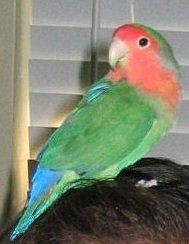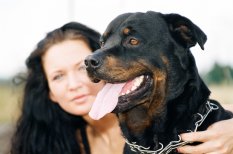Here are some parenting tips to help teach children to have mutually healthy relationships with their pets, so both can receive the maximum enjoyment from these relationships. Most people will remember for a lifetime their childhood pets, help to make the experience the best.
Teach your child how to read the pet's body language, especially when the pet is getting aggitated. This is true for all pets, but especially dogs, as dog bites or attacks can be extremely dangerious. Like kids are taught fire and other safety drills at school, show them what to do should they be attacked by a dog. This is actually good information for every child to have, because it may be needed someday due to a strange dog in a park or neighborhood.
If a child is attacked by a dog, they should roll in a tight ball, and protect their hands and face, yelling for help, instead of running and screaming. More information on this can be studied also.
Train your dog to obey the word "stop" and allow the child to issue the command, teaching how and when to use it. Teach your child that both the pet and child have the right to stop play time when either feels like it. If the animal starts to withdraw and shows signs of being done, teach your child to respect that and give the pet space.
Allow your youngster to do age-appropriate chores regarding care for the pet, this encourages compassion and responsibility for the child. It also helps them bond. Tips such as how to care for your pet bunny rabbit, or whatever type of pet you own should be researched so you are teaching accurate information in regards to pet care basics. Should a kid neglect the pet care chores, issue age appropriate consequences, but do not threaten to get rid of the pet. They might withdraw even more from the pet if they fear it may be taken from them, this can be very emotionally painful. There are better consequences. Don't let the pet pay the price either, by simply neglecting it until the child does feed it, etc. Intervene on this issue, for both their sakes.
Instruct your child to stay calm and quiet when interacting with the pet, to not scream or yell, as it can scare the animal. Teach them traits of how to pet the animal with gentleness, and not to poke fingers in eyes and ears, or mouth. Train them not to pull trails, and if you allow the child to hold the animal, how to propely hold it that will protect both.
Depending on what kind of pet you own, teach your child how he or she can teach their pet tricks. Affirm the child by showing the pet's body language that is responding to love. If the child is young, they should not be left alone with their pets. Too many accidents have occured for both the child and the pet by this practice. If a child accidently hurts the pet, those guilt feelings can remain for a lifetime.
Be diligent when your child has friends over. It may be too overwhelming for the animal, and other children may not have been taught to be gentle.
Pet ownership ultimately is the parent's responsibility to ensure that proper care is given to both the child, but also to the pet as well. Some may find its simply too much responsibility and life is too busy to add one more thing. That is ok, it is good to know a person's limits and not take on too much. Children can also get the joy of animals by visiting zoos, petting farms and the life, without necessarily owning a pet.

 How to Care For Newborn Puppies Without a Mother
How to Care For Newborn Puppies Without a Moth
How to Care For Newborn Puppies Without a Mother
How to Care For Newborn Puppies Without a Moth
 How to Take Care of a Dove's Baby
How to Take Care of a Dove's Baby
How to Take Care of a Dove's Baby
How to Take Care of a Dove's Baby
 Healthy Diet for Healthy Birds
It’s a well-k
Healthy Diet for Healthy Birds
It’s a well-k
 How to Care for a Turtle
How to Care for a Turtle
How to Care f
How to Care for a Turtle
How to Care for a Turtle
How to Care f
 Top 10 Tips to Ensure Pet Sitting Satisfaction
Whether its s
Top 10 Tips to Ensure Pet Sitting Satisfaction
Whether its s